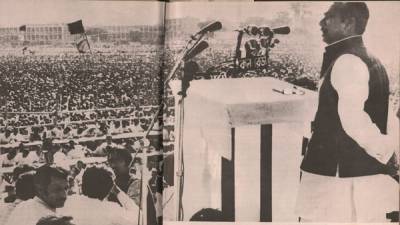| Home Introduction Bengali Literature Early History Islam in Bengal British Colony British Rule Sepoy (Soldiers) Rebellion in 1857 British Policy Muslim Nationalist movement Division of Bangla Muslim League Two Nations Concept Pakistan Period Political Discrimination Military Discrimination Language Movement Revolution of Ayub Khan Six Points Agartala Conspiracy Case Students 11 points Ayub Resigned & Yahya Came to Power General Election in 1970 Liberation War Declaration of Independent Government Formation Freedom Fighters Youth Spirit Surrender Genocide Atrocity Against Women How Many Died Criminals Photo Collections Links About Me (Resume) |
The inaugural session of the parliament due to begin in Dhaka was
abruptly postponed on the pretext of resolving differences between the
political leaders of the two wings. The Bengalees saw this as one more
conspiracy of the Pakistani military junta to deny them the power that
they had won democratically through elections. In his historic speech at
the March 7 public meeting at Suhrawardy Uddyan Sheikh Mujib declared
“Abarer shangram amader muktir shangram, Abarer shangram amader shadhinotar shangram” (“This
struggle is the struggle for freedom, this struggle is the struggle for
independence”). He asked people to continue the non-cooperation
movement they had started at his behest and prepare for a decisive
battle for independence. But to avoid a direct confrontation with Yahya
Khan’s bloodthirsty military he kept the door open for political
negotiations. Despite stiff opposition from his followers, especially
the vocal student community, Sheikh Mujib sat with Yahya and his
advisers to negotiate a constitutional settlement and when everything
appeared to be going well the dialogue was snapped on March 25. A
military crackdown was ordered, and Bangabandhu Sheikh Mujib was
arrested and taken away to West Pakistan. But just before he was
arrested he sent out a call for the liberation war to begin. Known as
the Declaration of the War of Independence, this hurriedly written
historic document read as follows: “Today
Bangladesh is a sovereign and independent country. Pakistani Army
suddenly attacked EPR Base at Pilkhana, Rajarbagh Police line and
killing citizens. Street battles are going on in every street of Dacca,
Chittagong. I appeal to the nations of the world for help. Our freedom
fighters are gallantly fighting with the enemies to free the motherland.
I appeal and order you all in the name of Almighty Allah to fight to the
last drop of blood to liberate the country. Ask police, EPR Bengal
Regiment and Ansar to stand by you and to fight. No compromise. Victory
is ours. Drive out the enemies from the holy soil of motherland. Convey
this message to all Awami League leaders, workers and other patriots and
lovers of freedom. May Allah bless you. Joy
Bangla”. ---Sheikh Mujibur Rahman A message in the form of a telegram reached the
hands of a few students from Sheikh Mujibur Rahman. The students were
excited to receive Mujib's message to the people, but were at a loss to
decide what should be done with it. AT last it struck them that the
message could be broadcast from Agrabad Station of Radio Pakistan. Dr. Manjula Anwar translated the message into
Bengali. As they took the message to the radio station. Announcer Kazi
Hosne Ara was picked up on the way. The Armed police guards posted there were Bengali's who immediately
opened the locks and allowed them to go in. Kazi Husne Ara rushed out
and brought with her Mahbub Hassan, Belal Ahmed and Abul Kashem Sandwipi. As the Bengali soldiers took positions to guard the transmission
center, the rebels put their heads together and secured the help of a
few engineers of the Kalurghat industrial complex to convert it into a
broadcasting station. The first declaration was broadcast on the morning of March 26,
1971. The message went: "
On Thursday night West Pakistani armed forces suddenly attacked the
police barracks at Razarbagh and the EPR headquarters at Pilkhana in
Dhaka. Many innocent and unarmed have been killed in Dhaka city and
other places of Bangladesh. Violent clashes between EPR and Police on
the one hand and the armed forces of Pindi on the other are going on.
The Bengalis are fighting the enemy with great courage for an
independent Bangladesh. May God aid us in our fight for freedom. Joy
Bangla." Major Zia was requested by the rebel station to
broadcast a message of independence to the people of Bangladesh. At 7:45 pm on 26th March 1971, Major Zia
broadcast the message which became historic in the struggle for
independence. "This
is Swadhin Bangla Betar Kendra. I, Major Ziaur Rahman, at the direction
of Bango Bondhu Mujibur Rahman, hereby declare that the independent
People's Republic of Bangladesh has been established. At his direction,
I have taken command as the temporary head of the republic. In the name
of Sheikh Mujibur Rahman, I call upon all Bengalis to rise against the
attack by the west Pakistani Army. We shall fight to the last to free
our motherland. By the grace of Allah, victory is ours. Joy
Bangla." A Japanese ship anchored mid- stream in
Chittagong harbor picked up Major Zia’s message. When the news of this
declaration was broadcast by Radio Australia, the rest of the world to
came know about our independence war.
|
